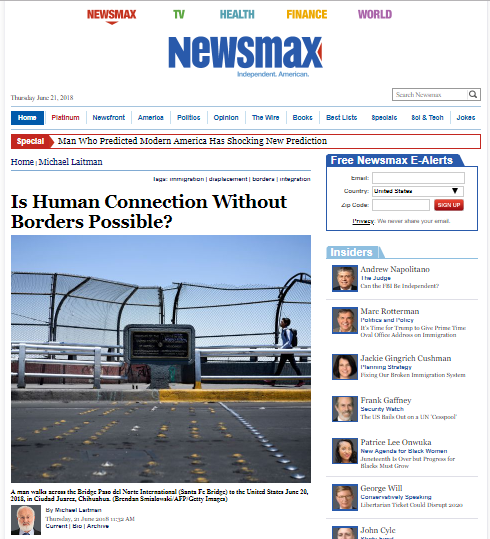
President Trump’s executive order reversing the policy of separating children from parents sent to jail for crossing the border illegally comes as no surprise, due to the international uproar the children’s ordeal caused. But what is next?
It is impossible to be indifferent to the humanitarian crisis of the last few weeks affecting more than two thousand children. The images of children crying inside cage-like detention centers struck a chord with me and the rest of the world, as families were torn apart.
It is understandable that those parents were looking for opportunities and a good future for themselves and their offspring, which they could not find in their home countries. But what would you do if you were the president of the United States, and promised to your constituency to implement a zero tolerance policy to stop illegal immigration?
That is what millions who trusted President Trump with their votes expect from him. And he is doing just that. So in keeping his word, he is trying to change the economy, trade, financial system, and homeland security, among other areas.
Solving illegal immigration to the U.S., however, is one of the most challenging conundrums. A permanent solution to the problem has been sidetracked for decades. Both Democratic and Republican policymakers have even turned a blind eye to let people enter the country illegally for their party’s own political gain.
A solid immigration reform that deters more people from breaking the law and encourages others to immigrate legally should start with an educational plan. Those applying for a permanent status would need to enroll in absorption sessions to get deeply acquainted with the American society, the country’s history, social norms, culture, language, and its laws.
The key is to evaluate the applicant’s true desire to become an integral part of society, and not add to segregated cultural ghettos in the country. Most of the problems with such isolated cultural conglomerates stem from an inappropriate absorption process.
Moreover, this situation is not limited to America. The United Nations Refugee Agency (UNRA) reported this week that the total number of displaced people worldwide rose to a record 68.5 million last year. No leader or organization today seems to know how to successfully handle immigrant integration into their respective countries and societies, because there is no clear understanding of what has led to such a large-scale displacement.
And what is this current state of affairs ultimately a consequence of? It’s the consequence of a new level of connection and interdependence among countries and peoples. Humanity is gradually erasing its boundaries, becoming a melting pot that will need to learn how to share and respect common values by developing a sense of a common destiny.
This is not only relevant for immigrants. As the world evolves, human society the world over will have to engage in a new process of learning and transformation, one that expands our perception of the world, the needs of our fellow man, and brings us to a realization that we depend on each other to not only succeed, but to survive.
There is still a long road ahead. A country should protect its frontiers, but humanity will continue developing to a state of one global family without borders. As Yehuda Ashlag, one of the great Jewish sages of the 20th century, wrote in his book “The Writings of the Last Generation,” “The whole world is one family … and every country is obligated to ensure that it won’t detain citizens who come to another country, and won’t close its gates to immigrants and foreigners.”
Featured in Newsmax